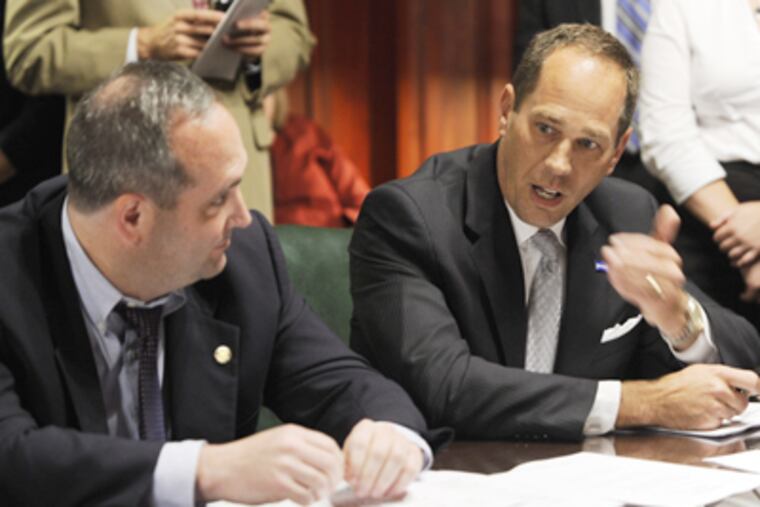Fracking ban is about our water
The eleventh-hour surprise decision by Pennsylvania lawmakers to ban natural-gas exploration across a swath of suburban Philadelphia is another sign that the region isn't ready for drilling rigs. It's possible that it never will be. In pushing through a drilling ban across a little-known rock formation in Bucks and Montgomery Counties, State Sen. Charles McIlhinney (R., Bucks) said he wanted to assure that communities were protected while experts evaluate a new report that identifies gas reserves under the two counties.

The eleventh-hour surprise decision by Pennsylvania lawmakers to ban natural-gas exploration across a swath of suburban Philadelphia is another sign that the region isn't ready for drilling rigs. It's possible that it never will be.
In pushing through a drilling ban across a little-known rock formation in Bucks and Montgomery Counties, State Sen. Charles McIlhinney (R., Bucks) said he wanted to assure that communities were protected while experts evaluate a new report that identifies gas reserves under the two counties.
The formation known as the South Newark Basin also reaches across central New Jersey, and a U.S. Geological Survey report in June estimated it may yield 876 billion cubic feet of natural gas.
It's not that drillers are clamoring to move into these suburbs, with vastly richer Marcellus Shale gas fields already being tapped from Pittsburgh to the New York border.
Indeed, McIlhinney's measure may have more to do with assuaging community anger over state-imposed rules that tie local officials' hands in using zoning to limit drilling.
The local ban's most important impact could be that it reinforces a region-wide drilling moratorium put in place by the multistate agency governing the Delaware River basin.
Across a four-state watershed, the drinking water for 15 million people would be imperiled if gas-drilling operations that pump millions of gallons of water, chemicals, and sand deep into the ground should go wrong.
Given such high stakes, the Delaware River Basin Commission (DRBC) wisely imposed its moratorium more than a year ago while it developed rules under which drilling might be permitted.
But fears about the purity of the state's drinking water cannot be regulated away easily.
Those concerns rightly prompted Delaware Gov. Jack Markell, a DRBC delegate, to halt any move toward lifting the moratorium for now. While the agency plans to meet Wednesday, there fortunately appears to be no renewed push to open the watershed yet.
Far from lifting its moratorium, the multistate agency should consider enacting a permanent ban on drilling as the only sure way to address Markell's warning that widespread gas-drilling contamination could leave "freshwater supplies likely requiring generations of effort to clean up."
Industry and state environmental regulators continue to discount any risk of water pollution from the hydraulic-fracturing drilling process, known as fracking. But a new Duke University study concludes that pathways in rock formations could allow chemicals and water contaminated by fracking to reach water supplies.
Against a backdrop of plummeting natural-gas prices, there may be less industry pressure to move into the region's watershed. At the same time, fewer wells will mean that the state's long-overdue impact fee on drillers probably won't produce the predicted revenue — funds that, in part, are needed to assure adequate environmental regulatory oversight by Gov. Corbett's pro-drilling administration.
In that type of climate, the best course for the state's largest region to date that remains free of shale-gas drilling rigs would be to keep it that way.